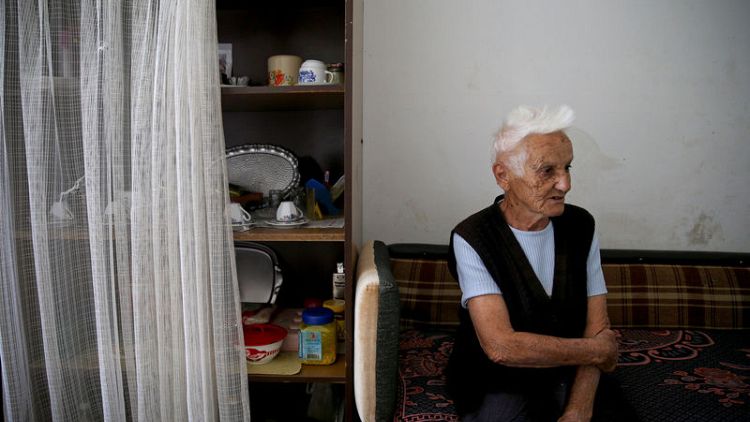By Dado Ruvic
MIHATOVICI, Bosnia (Reuters) - Edis Haskic has been living in a reception centre since 1995, when Bosnian Serb forces killed his father and 8,000 other Muslim Bosniak men and boys in the eastern town of Srebrenica in Europe's worst atrocity since World War Two.
He shares the destiny of more than 7,000 people from across Bosnia's ethnic divide, still displaced from the 1992-95 war and residing in 120 such shelters.
Their fate is not high on the agenda of Bosnian politicians whose campaigning for Oct. 7 general elections is characterised by ethnically divisive rhetoric and opposing views of Bosnia's future - the very issues at the core of the war in which 100,000 people were killed and two million driven from their homes.
Waiting for the state to assign him a new home, Haskic, 33, got married in the northern village of Mihatovici and is now trying to raise his own children with monthly state aid of 60 euros. He is forced to seek daily jobs to help make ends meet.
"Politicians are guilty for this situation because, apart from free meals, no other chance or help was given to me," he said, adding he has lost hope of ever returning to Srebrenica.
The 1995 Dayton peace deal ended the war by splitting Bosnia into two distinct regions - the Serb Republic and the Bosniak-Croat Federation - but ethnic tensions remain high, blocking progress towards membership of NATO and the European Union.
Muslim Bosniak children and Roman Catholic Croats attend the same schools but still learn from different curricula - a practice devised as an interim solution after the war that has persisted despite a top court ruling it as discriminatory.
"The politicians are guilty for everything. They are the ones who divide us," said Rasko Kovacevic, a Serb from a camp in the northern village of Kladari Donji, where life is far from easy.
Most families have only one room in which they sleep, prepare meals and even take baths. Many can use only makeshift wooden toilets shared by a dozen of people.
"They (politicians) only visit us before the elections when they need a vote but when I'm looking for a job, they just tap me on my shoulder," said Branko Mlikota, who lives in the Croat centre outside the southern town of Capljina for 24 years.
After many delays, the government has set a 2020 deadline for the closure of these centres. "They just promise but nobody has ever done anything for us," one refugee said.
Bosnians vote for a new presidency, national and regional parliaments on Oct. 7 in elections dominated by public frustration with the failure of authorities to tackle rampant corruption and sky-high unemployment.
(Writing by Maja Zuvela; Editing by Daria Sito-Sucic and Gareth Jones)
